
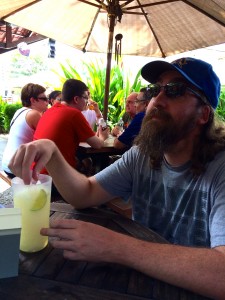
Sent out a story to an audio market.
More on Circus In the Bloodwarm Rain (novel): 574
Prairie Dog Town (working title)(story): 715 words. I’ve rounded the 3k mark on this, and think I’m in the home stretch. I want to finish it soon, so I have a few days to lay it aside and let it cool before I pick it up to polish as the next Patreon story.
Letters to My Father (story): 474 words, which finished it off, and sent it back to my charming collaborator/spouse.
Carpe Glitter (story): 457Â words, still a long way to go.
Total wordcount: 2220. As always I may try to get in a little more tonight, but probably not.
New Spanish vocabulary: a la parilla (grilled), la acera (the sidewalk), el barro (the mud), el largato (the lizard), la libreria (the bookstore)
Today’s been gorgeous and sunny, though very hot. We walked to Taco Bar for lunch, and found the food both delicious and a pretty good bargain. Then past the super mercado for dinner supplies and the trudge back home.
As noted on Twitter, I’ve been reading The Wheel of Time series since embarking on this trip, and I’ve finally hit the Brandon Sanderson part. Between that and spending so much time in travel, I haven’t had much time to read anything else, but I did finish up the first two books of Jeff VanderMeer’s Southern Reach trilogy, Authority and Annihilation, which I highly recommend. The final volume, Acceptance, comes out September 2.
...
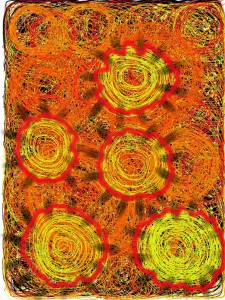
But for writers, I think it’s very important to go outside it on a regular basis. For one thing, your characters are going to be outside their comfort zones, being challenged, tested, thwarted, more often than not, because one thing about comfort zones is that they can be pretty darn boring to read about. Who wants a character for which everything goes right? (This is, I will argue, why the Richie Rich comic books were pretty darn bland.) How can you write a character outside their comfort zone if you don’t know what it’s like?
And outside our comfort zone is where we learn new things, new skills, new things about ourselves. Here in Costa Rica, my Spanish skill is leaping upward in a way it wouldn’t at home, despite all my best resolutions about daily Duolingo workouts or buying books in Spanish from Amazon. And that in turn has prodded me to try some new things with it, like using one of my stories as a practice piece in translation.
This is why, when I talk to students about going into a workshop like Clarion West or Viable Paradise, I urge them to try to fail. Because you learn so much more from a story where you tried something new and failed than one where you did the same thing you always did. I wrote Zeppelin Follies while at Clarion West as my very first try at a screwball comedy, and I will confess that the first draft was a horrible mishmash of stuff. And boy did I learn a lot from that.
Fortunately, for the vast majority of writers, we like new things. New words, new vistas, new thoughts. And we find them outside that comfort zone, in a place that is frightening and exhilarating all at once. Whizzing along a zipline, diving into waters over our head, talking to strangers. If you doubt that you are brave enough to do such things, remember that you do something braver everyday by putting your writing out there for other people to look at.
Enjoy this writing advice and want more content like it? Check out the classes Cat gives via the Rambo Academy for Wayward Writers, which offers both on-demand and live online writing classes for fantasy and science fiction writers from Cat and other authors, including Ann Leckie, Seanan McGuire, Fran Wilde and other talents! All classes include three free slots.
Prefer to opt for weekly interaction, advice, opportunities to ask questions, and access to the Chez Rambo Discord community and critique group? Check out Cat’s Patreon. Or sample her writing here.
...

So here’s the breakdown and total:
650 words on Circus in the Bloodwarm Rain
673 words on “Carpe Glitter”
534 words on “Prairiedog Town” (working title)
200 words and editing finished on a story in a semi-accepted state, plus sent off to the magazine that requested the changes.
Total word count: 2058
Not too bad, particularly when I’m working on getting back into productivity’s swing.
Today’s new words in Spanish: aire acondicianado (air conditioner), apogon (power outage), ballena jorabada (humpback whale), cafetera (coffeemaker), calambur (pun), picadura de mosquito (mosquito bite), la puerta de teja metallica (screen door), reinicializar (to reset, usually a machine).
And Wayne woke me this morning to watch three whales (we think a large humpback and two smaller ones) in the surf.
...

For a long time I listen to the ocean, a background of some chirping insect, shrill arcs of sound going out against that massive, constant grumble. That is what life is like, singing out against that gray and empty grind, not caring what it sounds like, because singing is the only thing you can do.
I can feel my shoulders relaxing as I type, the guilt of several weeks (over a month, really) of getting little done, not just because of the traveling or the distractions but because I let myself get lazy and forget that what a writer does is write. If you want to call yourself one, that’s what is necessary and while that’s a hard standard to maintain consistently sometimes in the face of a multitude of crises of the mind or body or world or family, it’s one I hold myself to, first and foremost.
A confession: I am not one of those writers who “have to” write, the ones seized with such a fervid muse that they cannot exist without words spilling out of them. I envy them, and sometimes in my heart, get irritated by a smugness that is really an interpretation imposed by my own insecurities.
But I have always defined myself as a writer, even in the days when I wasn’t writing so much and was pouring all that energy into writing for an online game or technical documentation or some combination of the two. So when I don’t do it, it’s not so much that it’s the writing building up. In fact, some days I’m digging the words out, and they’re obdurately clinging to the inside of my skull so I have to wrestle them onto the keyboard. Even now, I want them to flow and they’re halting, the flow coming in fits and spurts while all the time the ocean softly roars, as though it can’t help itself at times, perhaps getting just a little too excited, a little too enthusiastic in its mutterings.
Here’s the thing. When I’m not writing consistently, when I’m not hitting solid word count on at least most of the days of the week, I feel unmoored, adrift, unsure of my center. What good is a writer who isn’t writing?
There’s also an awareness of time creeping up on me. Often I wish I’d done more with those early years “” though who would have known in all that young adult thrashing about? While I don’t want to let guilt consume me, it’s not a bad goad. I believe it was John McPhee that said any motive for writing is valid, even spite and malice.
And it’s a goal that I know is doable, to hit two thousand words “” and more when I’m being motivated, which often coincides with felicities of mind or body. I don’t worry about whether they’re bad or good, all that matters is that they’re words that actually make it from my mind to the page. Right now I’m adding these words into the count, even though I don’t usually count nonfiction, because right now the focus is warming up, priming the pump, getting myself back into that productive groove.
It’s the days when I get no word count, not even a page written in a notebook, that really bug me, so when the words are flowing, there’s a point where all is well, when I can feel myself assembling words to express what I want to say and they’re falling into place quickly, one at a time but in a constant patter, like raindrops falling on the keyboard.
So tonight is swell and good. We’re here for a month, then probably onward to another country to try a few weeks there. I can get into a routine that feels productive and which includes some of the things that help ensure my mood is good and I’m undistracted by feeling unwell, such as good solid walking bouts and not eating junk food and getting enough sleep.
So what will I work on this month?
First and foremost is finishing up the YA novel I’ve been working on, along with several stories, two for anthologies and a couple for the Patreon campaign. While the stories will be fun and I do want to get them finished, the novel is what I want to be spending most of my time doing. I’ll be posting snippets and word counts as I go, keeping myself accountable. Because that’s another thing for a writer — you have to hold yourself accountable, because there’s nothing out there, really, to do it for you.
Good writing to you all. I hope you’ll get some words today as well.
...
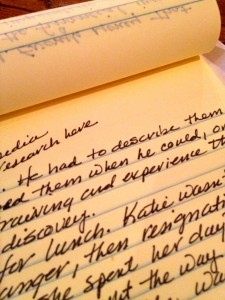 What I’ve realized I need is a system with a single notebook. One problem with decluttering has been the number of old, half-filled notebooks that have surfaced amid the piles and books, some taken from the storage locker after lingering there a literal decade. I’m writing this originally in one of those: 5×8, unruled, a stiff, translucent purple cover, originally intended as a spiritual journal. Since then it’s accumulated a number of to-do lists, some pieces of stories, a few book review notes, and some timed writings (including “Prophetic Lobster Man,” which appeared in The Mad Scientist Journal).
What I’ve realized I need is a system with a single notebook. One problem with decluttering has been the number of old, half-filled notebooks that have surfaced amid the piles and books, some taken from the storage locker after lingering there a literal decade. I’m writing this originally in one of those: 5×8, unruled, a stiff, translucent purple cover, originally intended as a spiritual journal. Since then it’s accumulated a number of to-do lists, some pieces of stories, a few book review notes, and some timed writings (including “Prophetic Lobster Man,” which appeared in The Mad Scientist Journal).
But it must go in a box and soon. I can’t trail fifteen gazillion notebooks along on a trip. I need one at a time, and preferably one that fits easily in a purse so I can have it ever handy but still has enough page space that I don’t feel cramped. Writing on scraps of paper when no notebook is handy has been my undoing in the past.
At the same time, I need to back up what I’m doing, so I’m contemplating a system where I write in my (solitary) notebook and then transcribe either every night or as time permits.
...
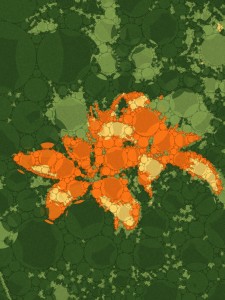 This is the YA SF novella (?) I’m working on.
This is the YA SF novella (?) I’m working on.
Synopsis: Stella’s life is on the unusual side, but whose isn’t nowadays, half a century after the Fall that led to this ruined landscape with its mesh of mythology and machinery? Still, being brought up as part of a troupe of circus performers wandering along the coast of the Inner Sea, going from small village to small village, sets her apart from many.
Even more alienating is the fact that she doesn’t know who her parents were. The others in the troupe deny any knowledge of them, and so Stella feels herself a stranger among them, particularly as adulthood draws near and she must figure out what her role with the circus will be.
When one of the circus elders reveal that Stella’s mother was, in fact, a circus performer, Stella must navigate feelings of betrayal, new responsibilities, and her mother’s legacy of magic-enhancing technology. When she fails to control her temper and half the circus burns down as a result, she’s ejected from the only family she’s ever known.
Accompanied by a village girl named Abacus (Abbie), the two strike inland, hoping to find the city that Stella’s father was rumored to come from. Their ingenuity and bravery are put to the test as they battle minotaurs, mutants, and other perils created by the crumbling technology of a long-gone scientific age.
When they finally come to the city, they find it deserted, much to their despair. But that night they are seized and taken to find Stella’s father, who lives far above on the space station. Abbie is slated to be the human sacrifice who will “pay” for Stella’s admission to the station, but when they find out they manage to (with great peril and suspense) flee to an abandoned lunar colony, where they come face to face with the greatest challenge of all: the aliens who created the Fall.
From the first chapter:
I’m practicing juggling again, because it’s raining outside, big fat bloodwarm drops drumming on the tent’s waxed canvas. In an hour, as the day’s light vanishes, the circus’s light will begin to flicker and shine, powered by the ancient turbine/treadmill pulled by three ponies and a servobot. Townsfolk will wander through the maze of entrance gates and aisles, hesitant and eager all at once, pockets full of silver slugs and other tradeable metal.
They’ll wander through the booths, looking at the freakshows and trying their luck at the games, winding their way towards the bigtop, ready to make their way up the creaking bleachers and sit to watch marvels unfold.
This time we’re within earshot of the ocean, a jungle-hugged glade near two different villages.
I drop a beanbag and curse. I’ve worked my way up to four at a time, but keeping five aloft continues to elude me.
Roto the Tiger Boy sticks his head in the flap in time to catch the last words. His whiskers twitch. He holds out a tin silently and I take it, gesture at him to sit on the floor. He does, closing his eyes as I start to apply the orange greasepaint that colors his dun fur, turning him from an ordinary cat-man to something more exotic.
What can I apply to myself, what will turn me into the exotic thing the circus just hasn’t realized it needs yet?
Enjoy this sample of Cat’s writing and want more of it on a weekly basis, along with insights into process, recipes, photos of Taco Cat, chances to ask Cat (or Taco) questions, discounts on and news of new classes, and more? Support her on Patreon..
#sfwapro
...

The whole point of a short story is to assassinate the reader. You don’t have the time or the space to go to war or do large maneuvers, you can’t do chapters of elaborate setup, there’s much less room for character development””a good writer can get more character development in, but that isn’t my particular strength. Anyway, everything in the short story has to drive toward a short sharp point, whatever it is you’re trying to leave the reader with at the end of the story.
I say “assassinate” and it sounds hostile, because it is. I work better when I can think in terms of opponents. The thing is that I don’t want the reader to see the short sharp point clearly from the beginning, but I want it to make sense afterward as the angle of attack. Tactical sense, I guess, in the context of the story’s setup.
Most of the time I write didactically, as if a short story were a proof. There is some object lesson, or ethical question, I want to leave the reader with. “Ghostweight” is a good example of this; it doesn’t pretend not to be didactic. So when I build the character and their strengths and weaknesses and motivations, when I build the setting, the majority of it needs to be in support of that point. With a proof, you want to include all the necessary axioms and arguments, but leave out the extraneous. A short story is very similar. I am not sure my math professors would approve of the use I am making of my college education, but there it is.
To me this is connected to something Michael Swanwick told my Clarion West class: in a short story, pick your antelope out of the herd and chase it whole-heartedly. If you change course midstream because that other antelope is limping or that other one comes with a garnish, you are likely to have no antelope at all.
So you must determine your antelope, by which I mean, you must figure out what’s the emotional core of the story, what’s its heart? What does it say about the state of existence? And once you know that, you can construct a narrative that grabs the reader through devices like sensory engagement, identification with the main character, and other beguilements until you have them trapped, at which point you force them to confront some fact of existence that may be normally unseen or even actively avoided.
Enjoy this writing advice and want more content like it? Check out the classes Cat gives via the Rambo Academy for Wayward Writers, which offers both on-demand and live online writing classes for fantasy and science fiction writers from Cat and other authors, including Ann Leckie, Seanan McGuire, Fran Wilde and other talents! All classes include three free slots.
Prefer to opt for weekly interaction, advice, opportunities to ask questions, and access to the Chez Rambo Discord community and critique group? Check out Cat’s Patreon. Or sample her writing here.
...
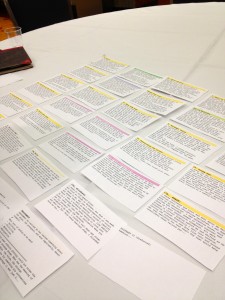
I haven’t done that many. “Logic and Magic in the Time of the Boat Lift” with Ben Burgis resulted from Ben describing what he wanted to write a story about — Miami and were gators and coke dealers — at more than one Wiscon. I wrote the beginning and sent it his way, and the back and forth began. Now we’ve got a similar lump in process.
Gio Clairval and I just finished up a flash piece recently. One of the things I’ve done to encourage collaborations is stick a bunch of word lumps up in a Google doc and just shared the doc so people could take a look and see if anything sparked. She liked a piece I’d done based on an image of a female acrobat.
Right now Bud Sparhawk and I just finished the novella “Haunted,” which started as a short story and kept growing and growing and growing. Bud plots things out a bit more thoroughly than I do, and it’s been interesting so far. Here we worked in Scrivener and laid out a story arc in cards before really setting to writing. I enjoyed it, because I think we’ve got a killer idea, and some clever twists, and some things that will hit nostalgic sweetspots.
So here’s my advice on collaboration based on my experience, which is somewhere past utterly new at it and yet not in the range of people like Mercedes Lackey, Andre Norton, Mike Resnick, and countless more.
Collaborative benefits include (for me, at least) new energy, someone to discuss a story with as it’s written, new insights into process, fresh ideas, and a kick in the butt to be productive.
Enjoy this writing advice and want more content like it? Check out the classes Cat gives via the Rambo Academy for Wayward Writers, which offers both on-demand and live online writing classes for fantasy and science fiction writers from Cat and other authors, including Ann Leckie, Seanan McGuire, Fran Wilde and other talents! All classes include three free slots.
Prefer to opt for weekly interaction, advice, opportunities to ask questions, and access to the Chez Rambo Discord community and critique group? Check out Cat’s Patreon. Or sample her writing here.
...
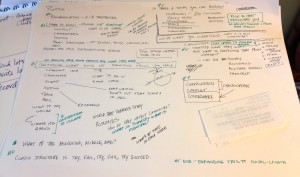
As always, everyone’s writing process is different and the only one I can speak with authority about is my own. So perhaps this will click for you and perhaps it won’t. I hope it does.
Certainly, there are stories that arrive complete. They appear in my head and all I have to do is write them down. This is most likely to occur during the night, meaning I can rise, go to the keyboard, and bang it all out quickly. For example, “Pippa’s Smiles” arrived complete and ready to go, though it had its roots in some thoughts I had been mulling over about gendered narratives. Unfortunately, though, that’s not usually how it works.
For me, stories can start in a number of ways.
...
 I’ve been teaching an advanced workshop that’s been a lot of fun. I gave them one of my favorite texts, an issue of Swamp Thing by Alan Moore called “Pog.” You might want to read it before proceeding on to the discussion of it. Go ahead, I’ll wait.
I’ve been teaching an advanced workshop that’s been a lot of fun. I gave them one of my favorite texts, an issue of Swamp Thing by Alan Moore called “Pog.” You might want to read it before proceeding on to the discussion of it. Go ahead, I’ll wait.
I picked that text because it has a high degree of emotional impact. It was a great starting point for talking about how to create that in a piece of fiction. In discussing how Moore achieved that, we realized that it is primarily constructed through the characters. While it’s nice to see the images, they are not the primary source of the impact.
Here are the five ways that impact is created:
So what takeaways for character building can one draw from this? Are there axioms that can be applied in one’s own writing? Of course there are, and here’s the list:
...
Want access to a lively community of writers and readers, free writing classes, co-working sessions, special speakers, weekly writing games, random pictures and MORE for as little as $2? Check out Cat’s Patreon campaign.

"(On the writing F&SF workshop) Wanted to crow and say thanks: the first story I wrote after taking your class was my very first sale. Coincidence? nah….thanks so much."

In this Medium article, Cat Rambo talks about how she tries to control her year in order to hit her writing goals.


This site is protected by reCAPTCHA and the Google Privacy Policy and Terms of Service apply. This site is a participant in the Amazon Services LLC Associates Program, an affiliate advertising program designed to provide a means for sites to earn advertising fees by advertising and linking to Amazon.com.